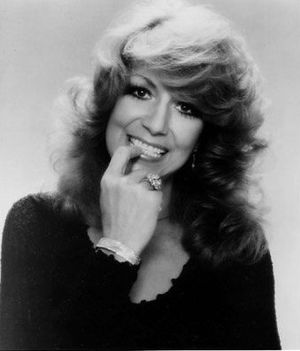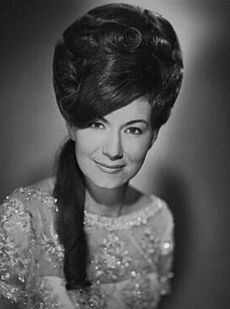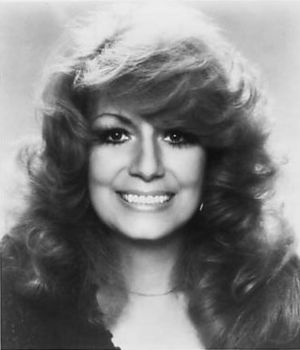Dottie West facts for kids
Quick facts for kids
Dottie West
|
|
|---|---|

West in a promotional photo from 1977
|
|
| Background information | |
| Birth name | Dorothy Marie Marsh |
| Born | October 11, 1932 McMinnville, Tennessee, U.S. |
| Died | September 4, 1991 (aged 58) Nashville, Tennessee, U.S. |
| Genres |
|
| Occupation(s) | Singer-songwriter |
| Instruments |
|
| Years active | 1959–1991 |
| Labels |
|
Dorothy Marie Marsh West (born October 11, 1932 – died September 4, 1991) was an American country music singer and songwriter. She was a very important and groundbreaking female artist in country music. She is often mentioned alongside her friends Patsy Cline and Loretta Lynn.
Dottie West's career began in the 1960s. Her song "Here Comes My Baby Back Again" became a top-10 hit. This song also won her a Grammy Award for Best Female Country Vocal Performance in 1965. She was the first woman in country music to ever win a Grammy.
In the early 1970s, West wrote a popular jingle for the Coca-Cola company. The song was called "Country Sunshine". It became so popular that she released it as a single. The song reached number two on the country music charts in 1973.
Later in the 1970s, she started singing duets with country pop star Kenny Rogers. These duets made her career even more successful. They had albums that sold millions of copies and several number-one songs.
Her duet songs with Kenny Rogers, like "Every Time Two Fools Collide", "All I Ever Need Is You", and "What Are We Doin' in Love", became classic country songs. In the mid-1970s, Dottie West changed her style and music. This helped her become even more popular as a solo artist. She had her first number-one solo hit in 1980 with "A Lesson in Leavin'".
In 2018, Dottie West was honored after her death. She was added to the Country Music Hall of Fame.
Contents
Early Life and Career Start
Growing Up in Tennessee
Dorothy Marie Marsh was born on October 11, 1932. She grew up in a small community called Frog Pond, near Nashville, Tennessee. She was the oldest of ten children in a very poor family. To help her family, young Dottie worked with her mother at their restaurant.
Later, she moved to McMinnville with her mother and siblings. She joined her high school band, "The Cookskins," where she sang and played guitar. In 1951, she received a music scholarship. She went to Tennessee Technological University in Cookeville, Tennessee. There, she met her first husband, Bill West. He was a steel guitar player. They had four children together, including country singer Shelly West. Dottie continued to use Bill's last name, West, in her music career.
Starting Her Music Journey
After college, Dottie and Bill West moved to Cleveland, Ohio. Dottie started appearing on a TV show called Landmark Jamboree. She was part of a singing duo called "Kay-Dots." At the same time, she often traveled to Nashville to try and get a record deal.
In 1959, Dottie and Bill auditioned for a producer at Starday. They were offered a recording contract. However, the songs Dottie recorded for Starday were not successful. Two years later, she moved to Nashville, Tennessee. There, she and Bill met many new songwriters. These included Willie Nelson, Roger Miller, and Harlan Howard.
Dottie often welcomed these struggling songwriters into her home. She gave them a place to stay and food to eat. In return, they taught her a lot about writing songs. During this time, she also became very close friends with Patsy Cline and her husband.
Patsy Cline became a huge inspiration for Dottie's career. Patsy gave her great advice: "When you're onstage sing to the audience with all of your heart and mean it. Then cast a spell over them. If you can't do it with feeling, then don't." In their early days in Nashville, Dottie's family often struggled to pay rent or buy groceries. Patsy would hire Dottie to help with her clothes. She also hired Bill to play in her band. Patsy even offered to help pay Dottie's rent or buy groceries when they were having a hard time.
On March 5, 1963, Patsy Cline died in a plane crash. Other country stars like Cowboy Copas and Hawkshaw Hawkins also died in the crash. Dottie West had been at the same concert as Patsy. She had asked Patsy to ride home with her and Bill in their car. But Patsy wanted to get home to her children quickly, so she chose to fly.
In 1963, Jim Reeves recorded a song that Dottie West had written called "Is This Me." It became a number-three hit that year. Because of this success, Jim Reeves helped Dottie get a recording contract with RCA Victor.
Country Music Success
1963–1975: Rising to Fame
Dottie West had her first top-40 hit in 1963 with "Let Me Off at the Corner." A year later, she had a top-10 duet with Jim Reeves called "Love Is No Excuse." Also in 1964, she met Chet Atkins, a famous producer. He agreed to produce her song "Here Comes My Baby."
This song made Dottie the first female country artist to win a Grammy Award. She won for Best Female Country Vocal Performance. This led to her being invited to join the famous Grand Ole Opry. "Here Comes My Baby" reached number 10 on the country charts in 1964.
After releasing the Here Comes My Baby album in 1965, Dottie worked with Chet Atkins again. The next year, they released Suffer Time, which had her biggest hit yet, "Would You Hold It Against Me." In 1967, West and Atkins released three more albums. These included With All My Heart and Soul with the hit "Paper Mansions."
During this time, she also appeared in two movies. She continued to have success as a solo artist in the late 1960s. Songs like "What's Come Over My Baby" and "Country Girl" were popular. In 1970, she was asked to write a commercial for Coca-Cola based on "Country Girl." Coca-Cola loved it so much that they gave her a lifetime contract to write jingles for them.
After her 1968 album Country Girl, Dottie teamed up with Don Gibson. They made a duet album called Dottie and Don. It featured the number-two hit "Rings of Gold" in 1969. This was her last album with Chet Atkins. In 1970, she released two more albums. One was Forever Yours. The other was Country Boy and Country Girl, a collection of duets with Jimmy Dean. Around 1971, she ended her marriage to Bill West. In 1972, she married Byron Metcalf, who was a drummer.
In 1973, Dottie West created another advertisement for Coca-Cola. It featured a song called "Country Sunshine." The commercial was so popular that she released the song as a single. It became one of her biggest hits. It reached number two on the country chart and number 49 on the pop chart. The commercial itself won a Clio Award for commercial of the year. Dottie was the first country artist to win this award. "Country Sunshine" was a big comeback for her. She was nominated for two Grammys for the song the next year.
After her 1974 album House of Love, Dottie had several more top-40 hits. These included "Last Time I Saw Him" and "House of Love." Her last album with RCA was Carolina Cousins, released in 1975. She then signed with United Artists Records in 1976.
1976–1985: Country Pop Star
In the late 1970s, Dottie West changed her image a lot. She used to wear simple dresses. Now, she started wearing sparkly, fancy outfits designed by Bob Mackie. Her music also changed from traditional country to more upbeat and adult contemporary styles. In 1977, she released her first album with United Artists, When It's Just You and Me. The main song from the album reached number 19 on the country chart.
In 1977, she was going to record the song "Every Time Two Fools Collide." Then, Kenny Rogers added his voice to it. When released as a duet, the song became Dottie's first number-one hit. The duo had more number-one hits with "All I Ever Need Is You" in 1979 and "What Are We Doin' in Love" in 1981. Their 1979 duet album, Classics, was also very successful. Dottie and Kenny became a very popular duo. They performed in big venues across the United States and other countries. In 1978 and 1979, they won the Country Music Association's "Vocal Duo of the Year" award.
In 1980, Dottie West ended her marriage to Byron Metcalf.
During the 1980s, Dottie continued to have solo hits. Her most famous was "A Lesson in Leavin'". She remained a popular performer at the Grand Ole Opry. "A Lesson in Leavin'" was her first number-one solo hit. It also reached number 73 on the pop charts. The album with this song, Special Delivery, had two other top-15 country hits in 1980.
In 1981, Dottie West had two number-one hits in a row. One was "Are You Happy Baby". The other was "What Are We Doin' in Love" with Kenny Rogers. "What Are We Doin' in Love" was her only top-40 hit on the pop charts, reaching number 14. Her 1981 album Wild West was one of her best-selling albums.
As the 1980s went on, Dottie's popularity started to slow down. However, she did reach younger audiences. She lent her voice to the character Melissa Raccoon in the film The Raccoons and the Lost Star (1983). This film was a start to the later TV series The Raccoons. Dottie's 1982 album High Time had her last top-20 hit, "It's High Time". Her next two albums were not as successful. Her last top-40 hit was "Tulsa Ballroom" in 1983. In 1984, Dottie left her record label and joined a smaller one called Permian.
In 1981, Dottie's daughter, Shelly, also became a country music singer. Shelly is best known for her duet with David Frizzell, "You're the Reason God Made Oklahoma", which was a number-one hit that year. As a solo artist, Shelly had her own number-one hit in 1983 called "José Cuervo". Shelly had several more hits in the early and mid-1980s. She left the music business after getting married in the late 1980s.
In 1983, Dottie married her sound man, Al Winters. In 1984, she appeared in a play called Bring It On Home. In 1986, she made her first movie appearance in the science-fiction film The Aurora Encounter. In 1984, Dottie West released her final studio album, Just Dottie. This album was not very successful. Her last song to appear on the charts was "We Know Better Now" in 1985.
Later Life and Passing
Financial Challenges
Even though Dottie West remained a popular touring artist, she started having money problems. In 1990, she ended her marriage with Al Winters. At this time, she had spent a lot of money and made some bad investments. This left her almost broke. She owed a lot of money to the IRS. She had to file for bankruptcy. This meant her belongings were sold to pay off her debts. Her fan club president said that the IRS would take her possessions, even her awards.
After a car accident and a public sale of her home and belongings, Dottie planned a comeback. She wanted to record a new album with friends like Kenny Rogers and Tanya Tucker. She also planned to write her life story. However, the album never happened. She recorded her last song in July 1991. It was a duet with Norwegian country singer Arne Benoni called "As For Me."
Her Final Days
On August 30, 1991, Dottie West was supposed to perform at the Grand Ole Opry. Her car, which Kenny Rogers had given her, stopped working on the road. Her neighbor, George Thackston, saw her and offered to drive her to the Opry. Dottie was worried about being late, so she urged him to drive fast.
Thackston lost control of his car on the highway exit ramp. The car went off the road and hit the middle barrier. Dottie did not think she was badly hurt and told the police to help her neighbor first. However, she had serious internal injuries. She had a ruptured spleen and a torn liver. Her spleen was removed, and she had two more surgeries to stop her liver from bleeding. But these efforts did not work. Doctors said Dottie knew how badly she was hurt. She even visited with Kenny Rogers before her last operation. On September 4, 1991, Dottie West died during her third operation. She was 58 years old.
Dottie West's funeral was held at Christ Church. About 600 friends and family attended, including Emmylou Harris and Johnny Cash. Her friend Steve Wariner sang "Amazing Grace".
A few weeks later, President George H. W. Bush, who was a fan, sent his condolences at the CMA Awards.
Dottie West's hometown of McMinnville, Tennessee honored her memory. They named Highway 56 the Dottie West Memorial Highway.
In 1995, actress Michele Lee produced and starred in a TV movie about Dottie West. It was called Big Dreams and Broken Hearts: The Dottie West Story. Michele Lee wore Dottie's original clothes and sang her hits. The movie was very successful. That same year, a book about Dottie's life was released.
In 1999, country singer Jo Dee Messina covered Dottie's hit song, "A Lesson in Leavin'." The song stayed at number two on the country charts for seven weeks.
In 2000, Dottie West was honored with the Female Golden Legacy Award. She was only the second woman to win this award, after her friend Patsy Cline. Her hometown of McMinnville holds a Dottie West Music Festival every October. In 2002, Dottie West was ranked number 23 in Country Music Television's 40 Greatest Women of Country Music.
Awards and Honors
| Year | Award | Category |
|---|---|---|
| 1963 | BMI Awards | Songwriters Award - "Is This Me" (w/ Bill West) |
| 1964 | BMI Awards | Songwriter's Award - "Here Comes My Baby" (w/ Bill West) |
| 1965 | Grammy Awards | Best Female Country Vocal Performance - "Here Comes My Baby" |
| 1966 | BMI Awards Awards | Songwriter's Award - "What's Come Over My Baby" (w/ Bill West) |
| 1973 | BMI Awards | Songwriter's Award - "Country Sunshine" |
| 1974 | Billboard Magazine | No. 1 Female Songwriter in the USA |
| 1974 | British Country Music Awards | Number-one Female Performer |
| 1974 | CLIO Awards | Excellence In Advertising - Country Sunshine Coca-Cola Commercial |
| 1978 | Country Music Association Awards | Vocal Duo of the Year - (w/ Kenny Rogers) |
| 1979 | Country Music Association Awards | Vocal Duo of the Year - (w/ Kenny Rogers) |
| 1979 | Music City News Country Awards | Duet of the Year - (w/ Kenny Rogers) |
| 2000 | BMI Golden Voice Awards | Golden Legacy Award |
| 2000 | Billboard Magazine's 200 Most Played Artists | Ranking - No. 44 |
| 2002 | CMT's 40 Greatest Women of Country Music | Ranking- No. 23 |
| 2018 | Country Music Hall of Fame | Elected |
In November 2003, Country Music Television ranked Dottie West at number 32 on their list of the 40 Greatest Fashion Statements in Country Music. This was for her glittery costumes and tight outfits from the 1980s.
See also
 In Spanish: Dottie West para niños
In Spanish: Dottie West para niños
 | Isaac Myers |
 | D. Hamilton Jackson |
 | A. Philip Randolph |



